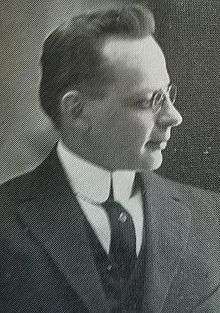John Birmelin
| John Birmelin | |
|---|---|
 | |
| Born |
October 31, 1873 Longswamp Township, Berks County, Pennsylvania |
| Died |
September 3, 1950 Allentown, Lehigh County, Pennsylvania |
| Occupation | Poet, writer, musician |
| Nationality | American |
John Birmelin (October 31, 1873 – September 3, 1950) has been called the Poet Laureate of the Pennsylvania Dutch and is one of the most popular poets and playwrights in the Pennsylvania German language.
Early life
Birmelin was born in Longswamp Township, Berks County, Pennsylvania to a Pennsylvania German mother, and a German father who was a native of Baden, Germany. He studied music at a young age, and by the age of eleven was an organist in the local church where his father was a member of the choir.
Career
In 1896, he moved to the city of Allentown in Lehigh County. In 1901, he accepted a job as the organist and choirmaster of Allentown's Sacred Heart of Jesus Church, a position he held until his retirement only weeks before his death in 1950 (his successor as organist and choirmaster at Sacred Heart was Karl Buesgen, Birmelin's student and noted Pennsylvania impressionist landscape painter). Birmelin was also the first music teacher at Allentown Central Catholic High School, a position he held from 1926 to 1936.
Literary
Although he wrote some poetry and verse as a young child, Birmelin did not begin writing again until the later years of his life. During the early 1930s, Birmelin's poetry was included as part of "'S Pennsylvaanisch Deitsch Eck" ("The Pennsylvania Dutch Corner") column in The Morning Call, and writings from Birmelin were in 62 of the first 100 published columns. His most commercially successful work was Mammi Gans: The Dialect Nursery Rhymes of John Birmelin, a Pennsylvania German translation of many of the Mother Goose nursery rhymes. Birmelin's poetry often dealt with aspects of Pennsylvania German life and history. "Gwendeltee", one of his earliest works, is a poem about a beautiful Pennsylvania German girl on a farm. "Regina Hartmann" tells about the return of a Pennsylvania German girl taken prisoner during the French and Indian War. "Der Laaf Kaaf" pertains to the Walking Purchase.
John Birmelin's Pennsylvania German translation of the song "My Country, 'Tis of Thee" (often known as "America") was, and still remains, regularly sung at Fersommling and other Pennsylvania German events:
| “ | Mei Land, ich sing von dir, Siess iss die Freiheet mir, Do will ich sei; So wie die alde Leit, So fiehl ich aa noch heit, Bin dir zu yedre Zeit Immer gedrei. An Felsebaerrye naus, Iwwer die Wolke drauss, Ring Freiheetsklang! Winters im diefe Schnee, Summers wann's Feld mit Glee, O Land, wie bischt du schee, Kling Freiheets Gsang! Unsrer Voreldre Gott, Fiehr uns in yedre Not, An deinre Hand! So lang mir dir gedrei, Bleibt des Land gross un frei; Du sollscht uns Keenich sei, Schutz unserm Land. |
” |
Legacy
According to Homer Tope Rosenberger, Birmelin "had the power to write compelling poetry in the dialect that makes one sad, or joyous, pensive, or reminiscent" and that Birmelin's poetry had "a special quality because he weighed carefully the sound of dialect words. Birmelin's poetry dealt with Pennsylvania German issues and life, "sometimes humorously and other times in serious vein" and he "wrote in the dialect with dignity, but with a warmth that went to the heart."
Bibliography
Plays
- Der Gnopp
- M Dr. Fogel sei Office Schtunn
Poems
- "'S Alder un der Dot"
- "Buchschtaaweschpielerei"
- "Celia von Berneville"
- "Gwendeltee"
- "Gezwitscher"
- "Der Laaf Kaaf"
- "Regina Hartmann"
Translations
- Mammi Gans: The Dialect Nursery Rhymes of John Birmelin (a collection of Mother Goose rhymes translated into Pennsylvania German)
- "My Country, 'Tis of Thee" (often known as "America") (translated into Pennsylvania German)
- Robert Louis Stevenson's A Child's Garden of Verses (translated into Pennsylvania German)
Collections and anthologies
- Poems in "'S Pennsylvaanisch Deitsch Eck" ("The Pennsylvania Dutch Corner") column in The Morning Call
- Gezwitscher (collection of poems, published in 1938 as part of the yearbook of the Pennsylvania German Folklore Society)
- Later Poems of John Birmelin (published 1951)
Resources
- Barba, Preston A. Introduction to Gezwitscher. The Pennsylvania German Society, III. Allentown, Pennsylvania, 1938.
- Buffington, Albert F. (ed). The Reichard Collection of Early Pennsylvania German Plays. Lancaster, Pennsylvania: Pennsylvania German Society, 1962. Pages 398-439.
- Haag, Earl C. A Pennsylvania German Anthology. Selinsgrove, Pennsylvania: Susquehanna University Press, 1988.
- Rosenberger, Homer Tope. The Pennsylvania Germans, 1891-1965. Lancaster, Pennsylvania: Pennsylvania German Society, 1966. Pages 215-217.